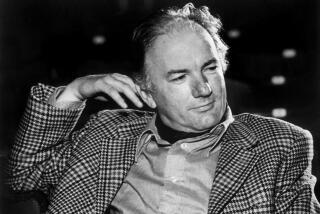From the Archives: Face of Great Actress Subtle Even in Death
Reporting From Paris — Sarah Bernhardt -- a famous French actress -- died March 26, 1923, in Paris. She was 78. She has a star on the Hollywood Star Walk. In 2005, the Los Angeles Times wrote: “[She] performed on stages all over the world, including four ‘farewell’ tours of America, made eight films and endorsed face cream, cars and Bronx real estate. Incomparably famous for the 60 years she was on stage and screen, she saw life as one long photo op and enthusiastically pioneered the cult of celebrity.” This article, from March 28, 1923, made The Times’ front page after her death.
There is but one sentence today on the lips of Paris -- “Bernhardt is dead.” It has been uttered alike by concierges and Cabinet ministers, midinettes and princesses. One hears it spoken softly in cafes and whispered in churches.
All who knew the actress personally are relating to groups of friends incidents in the life of the great woman. One of the few Americans who knew her for more than twenty years friendship with Mme. Bernhardt is George Tyler, theatrical producer.
“She was a woman of the ages,” he said. “To my mind she is the greatest world figure who has died since Roosevelt. I can recall no other woman so widely known who has passed since Queen Victoria.
LOVED HER WORK
“No person I have ever known had such amazing energy as Bernhardt. Something seemed to burn within her like a consuming flame, which at the same time did not burn her out. The more she did the more inspiration she found. Once I recall going over with her the details of an American tour. I asked if that wouldn’t prove too fatiguing. ‘No, the contrary,’ she replied.
“Some time before she had her leg amputated she confessed to me how much it troubled her. ‘Will it not interfere with your work?’ I asked. ‘I am in terrible pain every hour of the day,’ she answered. ‘But only death can stop me acting’ -- and she said it with a pain-twisted smile on her face.”
ALL CLASSES COME
Today, dressed like a story-book princess, she lies in a room banked high with flowers. In the flickering light her face appears even more enigmatical than in life. She is subtle, even in death.
Outside the house twenty gendarmes push and shove a long line of people of all classes who come with curiosity, tears and flowers in hop of seeing the actress dressed to make a farewell appearance.
Most of them, however, are only allowed to enter into the dark hallway where they sign the visitors’ register, and then pass out into the bright sunshine and a world green with spring.
PAPERS IN MOURNING
The newspapers are in mourning, though it is not necessary to read to know that dramatic art and poetry have lost their most glorious interpreter. The pages of the Paris Journals unite in one elegy to the great artist but her death-stilled “golden voice” is the only subject of conversation along the great stretch of boulevard cafes toward the old Porte Saint Martine Theater which saw her earliest triumphs.
Every dramatist, every poet, academician and celebrity of France, who knew Mme. Bernhardt personally or through her art is writing today in black-bordered newspapers of the loss of the world’s greatest tragedienne.
Maurice Rostand has risen to lyric heights in the Matin. Robert De Flers in Figaro, Pierre Wolff in Le Journal, Claude Farrere in Le Gaulois. Jacques Offenbach, and many others already have penned glowing tributes such as no heroine, and certainly no feminine artiste, has been accorded in decades.
CURTAIN DESCENDS
Mme. Bernhardt’s death was felt most poignantly at her own theater, where, curiously enough, her great role, “L’Aiglon,” was being played by a younger artist. The curtain descended suddenly. It was not necessary to announce that Mme. Bernhardt had died, and virtually the entire audience walked out with only their ticket checks as souvenirs.
Perhaps one of the finest tributes to Mme. Bernhardt’s art was paid by Pierre Wolff.
“What indeed was her secret? How can one define the essence of that penetrating charm which touched the most sensitive souls at the same time as it moved the [illegible] the enthusiasm of all her auditors; which was felt by the Old World as well as the New? I believe above all that Mme. Bernhardt knew primarily she must be a woman and an artist at the same time playing, as Lemaitre said: ‘With all her body and all her sex. She never ceased to be a woman. On the stage she loved and she cried, not only with all her soul, but with all her body.’
“Moreover, she was a musician through her voice -- that voice of gold which was a song, a lullaby, a melody -- a voice without power, however, which rose high without crying out, but which could be modulated to an infinite sweetness, obeying secret laws which seemed always impromptu always changing, always new.
“Above all she was an artist. She loved the truth, but more than truth she loved beauty. Rachel achieved tragedy that was more gripping. La Duse is more human, but no one knew as well as Bernhardt the art of combining harmony and grace in words as in gesture and in sentiment as in facial expression. Art and artfulness, truth and poetry, nature and beauty all joined in her and composed an inimitable alliance.”
CHURCH FUNERAL
The funeral has been set for Thursday afternoon from the Church of St. Francois de Sales, whose cure is Abbe Loutil, Bernhardt’s close friend. She will be buried in the family tomb in the Cemetery Pere la Chaise, where many great French men and women sleep.
In compliance with her wishes, the funeral will be simple, as she expressed as a desire that there be a great many flowers, but no funeral orations.
The “divine Sarah” lies in the bed where she died, her head slightly propped by a pillow, and with a coverlet drawn up so as to cover the arms. She is clothed in white satin, with a white tulle veil over her throats, close to the chin.
NO STATE SERVICE
The suggestion of Mme. Bernhardt’s friends that she be given a state funeral was not taken up by the government at today’s Cabinet meeting. It was explained there was no precedent for such a ceremony for any except noted public government personages.
Official action today took the form of the dispatch by Minister of Fine Arts Derard of an official representative to the Bernhardt home to sign the register and offer condolences.
From the Archives: Elizabeth Montgomery Dies of Cancer
From the Archives: Bert Corona; Labor Activist Backed Rights for Undocumented Workers
From the Archives: Baseball’s Joe DiMaggio Dies at 84
More to Read
Start your day right
Sign up for Essential California for the L.A. Times biggest news, features and recommendations in your inbox six days a week.
You may occasionally receive promotional content from the Los Angeles Times.






